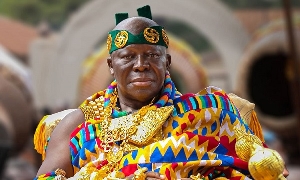Opinions of Tuesday, 24 December 2013
Columnist: Kwarteng, Francis
The Political Economy of Gender Fairness
-Part l
Potentially, how serious are “female genital mutilation,” “trokosi,” and “Witch Camps”? In fact, how are “Witch Camps” morally different from Apartheid-era Bantustans, Jim-Crowism, Apartheid, concentration camps, and reservations? Who says human beings truly enjoy the exclusivist ostracism of “Witch Camps”? As a nation with conscience, what are we doing to eliminate these “Witch Camps” once and for all? What are we doing to bring “female genital mutilation” to an end? What are we doing to bring “trokosi” to an end? Are these not as important as national security problems?
What are our institutions, if there are indeed any, doing as far as closely monitoring and studying girl/woman victims, as well as compiling relevant statistics on victims’ biological and psychological well-being after having being freed from institutional bondage? On the other hand, have we critically bothered to look at these questions in financial, productivity, intellectual property, labor, and development economics terms? Was it not Kwegyir Aggrey who said: “The surest way to keep people down is to educate the men and neglect the women. If you educate a man you simply educate an individual, but if you educate a woman, you educate a family”?
More pointedly, we are aware that, indeed, his is a trite quote, yet it’s implication for Ghana’s political economy is as relevant today as when he enunciated it many years back. In fact, the maxim has everything to do with the political economy of gender fairness and national development. We shall come back to this again. Meanwhile, we must begin to think about making the criminalization of “trokosi” a more serious offense than it presently is, as we advanced in “The Girl Child Is A Victim of Terrorism,” in which case, we believe, again, that “child sexual abuse” is less than appropriate in the legal circumstance, when, together, “trokosi,” “female genital mutilation,” and “Witch Camps” are made special cases of “terrorism.”
Technically, the politico-legal term “statutory rape,” we also believe, neither fully captures the magnitude of psychological, social, emotional, and biological damage which “trokosi,” “female genital mutilation,” and “Witch Camps” victims experience. For if they actually were, there would obviously not be either entrenchment or pockets of these practices anywhere in the system. These are serious matters and, therefore, don’t merit legal and political frivolities on the playfield of fairness. We do, however, concede that “law,” in and of itself, has no jurisdictional presence in society without political chaperonage of enforcement. Educating the citizenry about these laws is another matter.
Moreover, remember, we are dealing with serious questions of medical diagnosis, of social and medical symptomatology, that is, in connection with the injurious effects of “female genital mutilation,” “trokosi,” and “Witch Camps.” Prof. Joy Degruy, a clinical psychologist and social worker, has demonstrated how generational trauma still lingers on even after traumatizing stimuli are removed from the object (See “Post Traumatic Slave Syndrome”). Also, the work of Dr. Na’im Akbar is equally important, for one, he has questioned why “normality” and “abnormality,” two Eurocentric constructs, are made functional normatives based on the behavioral totality of the majority.
He has, therefore, proposed Afrocentric revision of these capsules of psychological phenomena, in which, more importantly, considerations of African culture and values earn their due in the scientific evaluation of human psychology. That said, let’s reiterate our position that our problem is, indeed, a legal, not necessarily a medical, one, though there is a clear overlap. In theory, it is medical science from whose ideological perspective the “law” should seek explanatory sanctuary as well as enforcement powers of self-definition. Yet, we must seek a social or political compromise between legal formulations of “terrorism,” a point we have already advanced, and medical anthropology.
Stated differently, separating the criminalization of “child sexual abuse” from “adult rape,” say, under the moral umbrella of our newly-proposed definition of “terrorism,” defines the political motif of our legal battle, though medical anthropology constitutes the subterranean social engine driving our legal train of theorizing. Nevertheless, our legal wrangling becomes more technically convoluted when we include the additional psychiatric variable of recidivism. Unfortunately, the entrenched nature of these practices has not convinced us otherwise, that they are going away any time soon, but that is not an excuse for inaction. Malcolm X has a good word of advice for us. He says: “There is nothing better than adversity. Every defeat, every loss, contains its own seed, its own lesson on how to improve your performance the next time.”
On the other hand, Nelson Mandela has also advised us to triumph over fear, to muster courage, and to push ahead in the face of adversity. This is why we have been diligently demanding a legal paradigm shift, a piece of legislation more powerful than the present constitutional injunction imposed on these practices, for, as some of us may have known already, a radically new layer of moral conscientization above the social laziness of public psychology, in addition to constitutional proaction, is, to say the least, badly needed. Therefore, we must not treat these practices merely as “a duty to rescue,” a tort law concept. Public apathy is patently not the answer.
Simply put, the girl child must not be left to face any of the well-known apathic social tendencies ascribable to the phenomenon of “bystander effect.” However, we do face another theoretical complication in that questions related to spiritualism, otherworldliness, and morality don’t necessarily always share an interpretive space with material culture in the mutual inclusiveness of human psychology. Indeed, this moral concern harks back to how we can effectively confirm or disconfirm divine edicts. Plus, these are very difficult questions. Moreover, we still don’t know for certain if deified otherworldliness and spiritualism are purely non-material products of the evolutionary intellection of man. Even if they are, how can they help us address the problems? Let’s leave these philosophical questions aside for now.
The other question, a pressing one, of course, is: How do we effectively, if not successfully, rehabilitate the traumatized girl child who has experienced the shameful brutalities of “female genital mutilation” and “trokosi”? How do we effectively, if not successfully, rehabilitate an elderly woman banished to the frigid social island of a “Witch Camp”? Let’s go a step further: Is “female genital mutilation” cultural? We don’t know, yet, once again, as elsewhere, Efua Dorkenoo, an international “female genital mutilation” activist, bluntly admits in a huffingtonpost blog piece that it’s not “cultural.”
This sharply departs from Diopian anthropology. Besides, this is not the time for politically anthropologizing the question. Medical anthropologization of the question via vigorous constitutionalism is the way forward. What is it then? She says it’s “violence against girls and women.” Then again, “Daughters of Eve” and “Equality Now,” two international organizations fighting “female genital mutilation” and other discriminatory practices against girls and women, concur. We do agree as well.
However, if we agree that all three practices, “female genital mutilation,” “trokosi,” and “Witch Camps,” are different forms of physical, spiritual, and psychological violence society perpetrates against the person of girlhood/womanhood, then, as we have pointed out several times elsewhere, let’s not minimize the psychological, physiological, emotional, and spiritual enormities deriving from these practices, for either political expedience or ethnic trivialities, as they are collectively bigger than ethnic individualism. Indeed, we’ll get nowhere in terms of formulating practical solutions if we don’t learn to bury all the uncritical tendencies, unhinged tendencies to ethnicize these problems, a chronic behavior we are wont to put on.
In fact, progress is most likely realizable via progressive nationalism and unified continentalism, as well as through proactive institutional oversight. Technically, by unified continentalism we simply mean African unification in the strictest sense of Afrocentric Pan-Africanism. Having said that, we propose that “trokosi” and the other two practices should be legally lumped together under the new definitional codification of “terrorism.” Understandably, “ritual murder” belongs in this category as well. We merely added this reprise for constitutional emphasis.
Let’s move on. The next question we think should be morally weighed in conjunction with the afore-cited theoretical considerations is, in our opinion, another proposed legislation about the “quality” or “size” of punishment, something proportionate to the crimes of “trokosi” and “female genital mutilation,” again, to be evaluated under our newly proposed definition of “terrorism”! Should priests who falsely accuse or label women as “witches” and thence banished to “Witch Camps” face firing squads? Should priests who rape “trokosi” girls be dumped into the oceans? Should men and women who subject girls to “female genital mutilation” be burnt alive? We don’t know.
We can only say that the “size” or “quality” of the punishment must be an amplified version of what we currently have on the books for “statutory rape” or “child sexual abuse.” That said, we also believe a determination of the “quality” or “size” of punishment should be arrived at through plebiscitary consultations. This calls for educating the general public about the destructive nature of the practices and their negative impact on national development. We may have to admit that our controversial propositions somehow share logical parallels with the arguments Justice Stephen Breyer’s advances in “Active Liberty” and “Making Our Democracy,” two excellent guideposts.
Admittedly, clear and unambiguous language is required in educating the masses. Political, ideological, and religious neutrality should be strictly adhered to. Elsewhere, we have argued that retrogressive ethnicization or ethnocentric politicalization of our problems is not the way forward. The strength we find in unity should be the basis for national discourse. This is very important for intra-national cohesion.
We shall return…












